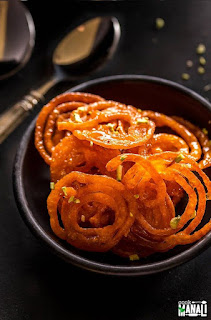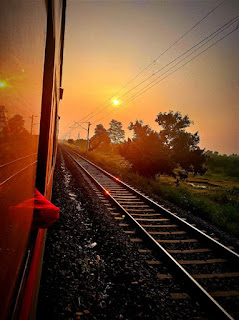Gujjiya(s), Jalebi(s), and Gujrati(s)
"My Saturday nights end with a pile of dishes and kitchen clean-ups, reminiscent of the weekend gatherings I enjoyed with my friends.
My love language is cooking elaborate meals, and then pretending that I didn't spend 5 hours on them, with the people I care about. I am the son of Gujarati parents, and this is how we express our love.
One Sunday morning was notably different; I received a phone call from my dad. I looked at my phone, it was a WhatsApp call, and I was reminded that he was at our ancestral home, spending time with our extended family.
I answered, "Jayshree Krishna ppa" (Hello Dad).
"Jamvanu thai gyu" (Have you had food?), he asked. In Gujarati culture, instead of a simple "Hi," we start by invoking the name of God and inquiring if someone has eaten well. When you deeply care for someone in our culture, you want to ensure they have eaten enough.
"Chai pidhi che hmda" (I just had a tea), I responded.
"Ek jaruri waat karwa ni che tara thi" (I have something important to tell you), he replied.
"Your grandfather has passed away, and we are bringing him home from the hospital; the Antyesti (Hindu Funeral) is scheduled for this evening."
My heart sank. What do you say to your father when he has just lost his own father?
"Are you okay? I'm sorry," I asked him.
"I love you, and I am here for you." Those were the words I didn't say. I had never said "I love you" to my dad, and he had never said it to me. I couldn't imagine my grandfather had ever said those words to him, and now he would never hear them.
That doesn't mean I didn't grow up feeling loved by my family; I did. "I love yous" were just expressed differently, as is the case in any typical Indian middle-class family. At 5 A.M. every morning, both my parents would be up, making me a hot breakfast and driving me to school, even on freezing winter mornings. "I love yous" were two cut apples that my sister and I shared on the days we could afford them. Love was measured in all the clothes that only my sister and I got on festivals before my parents' wallets ran out of cash.
I replied to my dad, "What should I do? How can I help?"
"There is nothing you need to do; everything is taken care of here. You don't need to come home for the Antyesti; your education is most important now, and we will be okay. Don't worry."
Normally, I would have simply said, "Okay," and obeyed. In Gujarati culture, respecting your elders is one of our core values, but I paused. What if what my dad wanted was not what he needed?
I heard myself saying, "No, Dad, I'm coming."
To my surprise, I heard, "Okay, but you won't be able to reach today; there are no train tickets available."
Fifteen minutes later, I was at the train station.
Changing five trains on the way, pleading with multiple ticket collectors, I reached my house just in time to catch the last glimpse of my grandfather. My dad was already at the gate.
"What do you do when you see your dad for the first time since he lost his father? Do you touch his feet, greet him with folded hands, or hug him?"
I couldn't do anything, but my dad took two steps forward, grabbed my two bags, and put them inside the room.
I walked in and saw my Uncle. He said, "Bhumik." Before I could say anything, he handed me two rolled theplas. I walked over to my mom, my aunt, and my grandma, who were all sitting on the floor, sobbing.
Soon after, it was time to light the funeral pyre. I was asked at the end to accompany my dad and my Uncle in taking rounds with an earthen pot and lighting the fire on the wooden platform where he was laid. My dad cried, and I was sad but really glad that I could be around. The next day, I had to go back to my hostel; there was an exam on the same day. My parents insisted on taking me to the train station.
The train came in, and we began our traditional goodbyes. I touched the feet of all the elders and hugged my sisters. My mom said, "Go hug your dad and say goodbye to him." I paused, I froze, and then I took a step forward. Then my dad said something, stuck out his hands, and said, "No." We waved goodbye, and as the train was about to leave, my dad said, "Bhumik, raasta ma kaiyee khaiye leje" (Make sure you eat something on your way).
"I will, Dad. Make sure that you eat something too."
 |
| Some sweeter memories |

Comments
Post a Comment
Hey, let me know how you feel about this post here